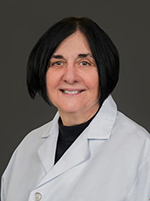What Is ALS?
Amyotrophic lateral sclerosis (ALS), also called Lou Gehrig’s disease, is a disease that affects nerve cells, also known as neurons, responsible for voluntary movement. When ALS starts, neurons begin to die. This results in progressive muscle weakness leading to paralysis. As the disease progresses, individuals lose the ability to move, speak, swallow, or breathe. The condition can affect anyone at any age, though it typically sets in when an individual is at least 55 years of age. Men are slightly more likely to be affected than women.
What Causes ALS?
Unfortunately, the root cause of ALS is currently unknown. Approximately 5 to 10 percent of cases are inherited, while the majority of cases occur with no known family connection (known as sporadic ALS). Current research indicates that a risk gene for ALS does not always result in developing the disease. Researchers are still not sure why some people with risk genes develop ALS while others do not.
Current research connects motor neuron damage to several factors for inherited and sporadic ALS. These include:
- Inflammation in the nervous system
- Oxidative stress, or an imbalance between chemicals that hurt and protect cells
- Abnormal protein clumping, when proteins in the body stick together
- Abnormal protein production by DNA and RNA, when the body make proteins the wrong way
- Excess glutamate, a “chemical messenger” that can be toxic if there is too much
In addition, environmental exposures may increase the risk of developing ALS, including military service, smoking, and possibly sports and head trauma.
See more ALS frequently asked questions from the Temple MDA/ALS Center of Hope.
Symptoms
While ALS usually starts in the arms or legs (known as limb onset), it can also start in the muscles of speech and swallowing. ALS eventually spreads throughout the body. As this occurs, the symptoms can be extremely troubling, making even the simplest task impossible. Initial signs of ALS include:
- Clumsiness — Due to weakened muscles in the hands and feet, it becomes difficult to hold things. Tripping and falling may become common.
- Head and neck problems — Swallowing and even holding the head up become difficult. Speech becomes slurred.
- Mobility issues — Weakness in the legs, feet or ankles makes it difficult to walk and perform many daily activities.
- Muscle twitches — Cramping muscles in the arms, shoulders and legs can occur associated with twitching of these muscles.
Treatment Options
Though there currently is no cure for ALS, multidisciplinary treatment with a team of specialists provides the best chance at both long-term survival and quality of life.
Treatment options include:
- Multidisciplinary Care: Professionals with different skills work together to treat specific needs and functions. With ALS, patients and their families face physical symptoms emotional challenges like depression and family distress. A team of specialists gives the best support to patients and families, and can include:
- Physicians: Neurologists, Pulmonologists, PM&R physicians
- Nursing
- Therapists: Physical therapists, occupational therapists, speech and language therapists and assistive technology professionals
- Nutritionist
- Respiratory therapist
- Social worker
- Mental health support
- Genetic counselors
- Disease-directed medications: There are now three medicines that are approved by the FDA to treat ALS.
- Riluzole, which can slow disease progression. It extended survival by 3 months in the clinical trial.
- Radicava, which works by reducing oxidative stress
- Relyvrio (AMX0035) is a combination of Phenylbutyrate + TUDCA. When these drugs are combined they work together to protect neurons by reducing oxidative stress and improving the way proteins are handled so they do not clump.
- Symptom management: Medications and interventions can help manage uncomfortable symptoms and improve quality of life. Physicians can help manage constipation, cramps, drooling, shortness of breath, increased emotions, and stiffness.
Ready for an Appointment?
If you're experiencing signs or symptoms of ALS, schedule an appointment or call 800-TEMPLE-MED (800-836-7536) today.
Learn more about our doctors and care team who diagnose and treat ALS.

